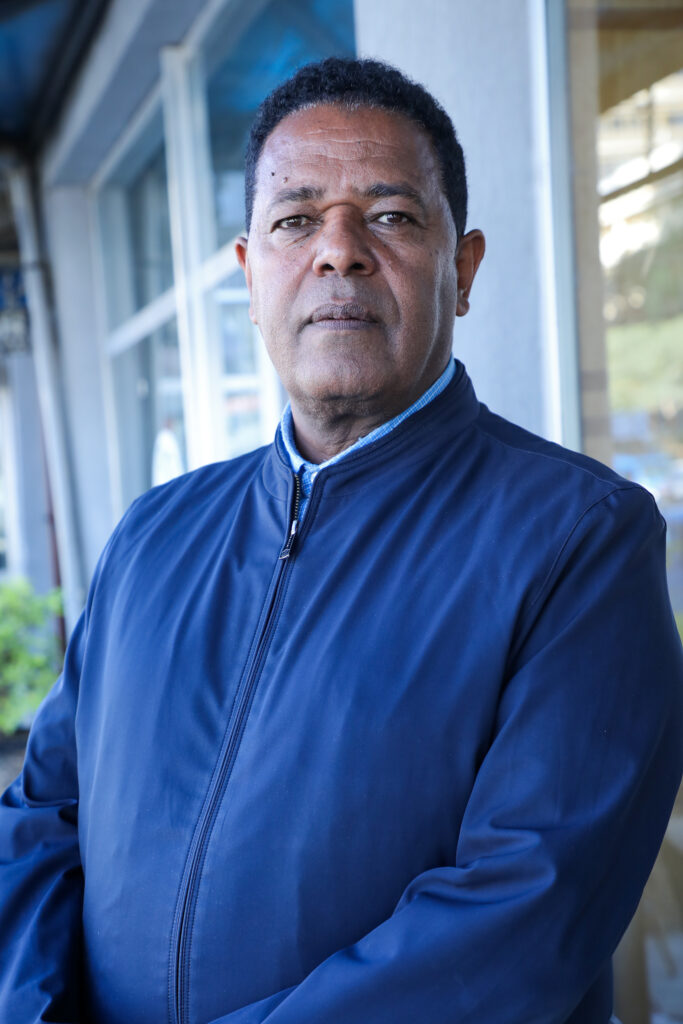A Beacon of Hope for Vulnerable Women in Tigray Region
 Adigrat, Tigray Region, ETHIOPIA: Aba Hagos, a religious leader of the Ethiopian Catholic Church in Adigrat Town, is a man whose compassion and tireless advocacy have made him a beacon of hope for vulnerable women and girls. He has been tirelessly challenging harmful traditional practices, combating gender-based violence, and raising awareness about the rights and dignity of women and girls, being a voice for the voiceless.
Adigrat, Tigray Region, ETHIOPIA: Aba Hagos, a religious leader of the Ethiopian Catholic Church in Adigrat Town, is a man whose compassion and tireless advocacy have made him a beacon of hope for vulnerable women and girls. He has been tirelessly challenging harmful traditional practices, combating gender-based violence, and raising awareness about the rights and dignity of women and girls, being a voice for the voiceless.
Aba Hagos witnessed firsthand that the suffering of women and girls in the region worsened during the recent two years conflict in northern Ethiopia. The road to Adigrat, the nearest town with medical facilities, was often impassable due to military blockades, leaving survivors of rape and violence with limited access to the care they desperately needed.
Aba Hagos has been working closely with the Women’s Association of Tigray (WAT), an implementing partner of UNFPA, in the effort at addressing the deep-rooted gender inequalities and social norms that perpetuate violence against women and girls. Through his involvement in training programs hosted by UNFPA, he has acquired the expertise to address critical issues such as gender-based violence, child protection, and peace building at the grassroots level. These training have equipped him with the skills to educate and mobilize his community effectively.
Championing Engagement of FBOs
Through his work with the WAT, Aba Hagos has been bridging the gap with respect to the engagement of faith-based organizations (FBOs) in the efforts at preventing and addressing GBV. Aba Hagos works closely with WAT’s team to educate and raise awareness about harmful practices like child marriage, female genital mutilation (FGM), and domestic violence. Through sermons, community gatherings, and one-on-one counseling sessions, he reaches out to individuals at all levels of society—encouraging them to challenge these practices and embrace more equitable ways of living that respect the rights of women.
Terhas Mekonnen, Manager of the Eastern Zone Women’s Association, emphasizes, “Aba Hagos understood that his position as a religious leader went beyond preaching faith—it carried a deep responsibility to advocate for justice, healing, and the protection of the most vulnerable.” She notes that his messages have sparked a wave of change not just in his town, but across the entire region.

One of Aba Hagos’s most significant contributions has been his involvement in the establishment of an interreligious council in Adigrat—a council that brings together leaders from various religious traditions to collaborate on issues that affect the local community. The council has become a vital platform for raising awareness about gender-based violence and harmful practices, and Aba Hagos is often the driving force behind community conferences that address these issues head-on.
“Every woman deserves dignity and respect,” he tells the gathered crowd at each of these conferences. “No woman should suffer in silence, and no woman should be blamed for the violence done against her.” He advocates that it is not just about addressing the physical wounds inflicted on women, but also the emotional and social scars. Aba Hagos has tirelessly worked to change the narrative around survivors of sexual violence, encouraging communities to stop stigmatizing women who have been raped and instead to condemn the perpetrators to count.
Call to Action
“There is always a spark of hope, even in the darkest moments,” Aba Hagos says. “I remind them that they are not alone, that we will fight together to bring an end to this suffering.”
Despite the progress made, Aba Hagos is quick to acknowledge that the fight to end violence against women is far from over. “Even if I am doing my best as an individual,” he says, “there is a need for integrated efforts from all sectors—civil society, government, international organizations—to help bring an end to the suffering of our mothers and sisters.”
His plea for collective work is a call to action for everyone—from local people to global leaders—to take responsibility for the future of women and girls in Tigray. Aba Hagos believes that only by working together, by acknowledging the injustice and taking concrete steps to change the system, can lasting transformation happen.
“Every woman and girl,” he says, “deserves to be treated with the same love and respect we give to our mothers and sisters. Together, we can make that a reality.”
***
Source: This story is authored by UNFPA Ethiopia.